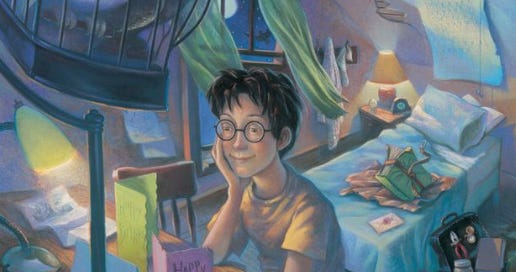I posted the first half of this piece on my birthday last month. But had a few more thoughts along these lines today, thinking about the 25th anniversary of Harry Potter.
I was 11 years old when I picked up The Sorcerer’s Stone, the same age as the main characters, and so we were children together on the cusp of adolescence.
I remember falling into that book and knowing it was fantasy and knowing what fantasy meant and knowing that Hogwarts didn't really exist and yet—that summer—a part of me thought: But perhaps a letter will come by owl. The universe of Harry Potter fitted so neatly into the universe I inhabited that nothing ruled out its existence. Invisible edges separated the two worlds. Perhaps I would find such an edge and peel it back. Of course, I would never have said such things out loud. I knew those fantasies were ridiculous and yet—
—if there were witches—and witches don’t exist, of course, I knew that, everybody knows that—but if there were witches, I was surely a witch, and if I were a witch, everything would make sense: that misfittedness I could never shed, that shapeless longing I had...
In any case, I was terribly lonely then. My runaway imagination kept me company, nourished me. I clung to the possibility that fantasy could be more than fiction.
Take the 11-year-old girl I once was. What if my desires had taken some other form? What if I had wanted to be not a witch but a boy? Could I—at that age when I couldn't quite separate fantasy and reality, no matter how cleanly I would have divided the two if asked—have consented to trade my open future for the circumscribed one transition offers? Even if adults had made the limits of transition clear to me—even if I said I understood—would I have understood what inexorability means? Wouldn't my fantasies of transformation have survived underground, out of sight, nurtured by the strength of feeling that made those fantasies necessary to me?
I think this gets underrated: the extent to which someone who feels stranded or desperate or alone in the world needs something that's not true to be true.
We run up against this all the time in the trans debate, these impossible imperatives: This must be true because I need it to be true. Transition must work because I need it to work. I must become—not merely pass or approximate—because I need to become. Whatever you do, don’t tell me it won’t work. Don’t tell me it’s just a fantasy.
Pain lines these desperate fantasies. That's what gives the constant injunctions to "be kind" their moral force: hold up the impossible desire for what it is and you uncover real pain. It’s tempting to play along, to enter into the fantasy ourselves rather than risk rupturing it. But that fairy-lit path darkens.





I almost think we should start asking people "what do you mean by 'kind'?" when they bring it up. To me, kindness means treating someone how you would like to be treated. I think in many people's minds, 'kind' – or 'inclusive' for that matter – just means "just go along with it" or "don't make a fuss" which seems more like deference or submission to me. I wouldn't want someone policing their speech around me, forcing themselves to be around me if they felt uncomfortable, or saying things they didn't actually believe in order to placate me – all of these, I would find annoying, patronizing, and disrespectful.
I am certain that if I were a teenager today that I would fall down this transgender rabbit hole. I too fell into fantasy literature when I was a teen - I really thought I could do magic and got into wicca when I could get a hold of the books (pre-internet days). Then, in the mid-late 90s, when the internet was still text based I got into IRC (internet relay chat) and fell down my next rabbit hole - Otherkin. Otherkin was/is a group of people who "Awaken" into the realisation that they are an elf or dragon or fae etc in soul (or reincarnation) and that explains why they've always felt so different from everyone else. Sound familiar? Some elf Otherkin would get their ears modfied into points so they looked more authentic. Some would just dress up at medieval fairs.
My trans-ID daughter laughs when I tell her this story - not realising how close her trans-ID is with this. She is autistic - of course she feels different from the other kids.
Luckily, I did not share my beliefs with many people - so when it came time for my Otherkin belief to fade away it did just that. In this current climate we're not set up for the kids to experiment with ideas and then let them fade away over time - they are celebrated and locked in.